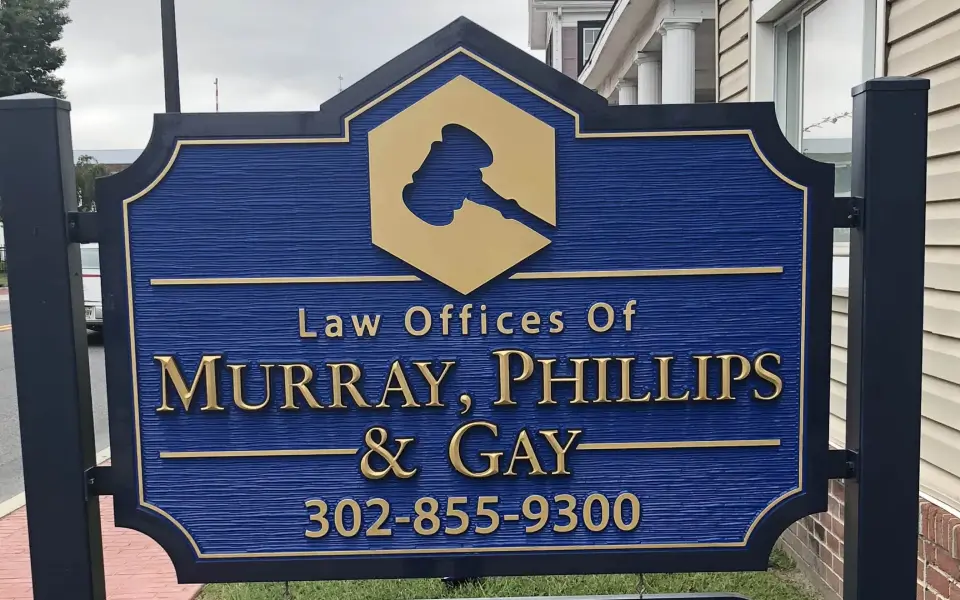Real Estate Lawyer
Professional Wills And Estate Planning
Owning and being involved in real estate, even if it is just your primary residence, can be a very exciting and rewarding endeavor. However, issues can arise. Don’t go it alone. Get help from a skilled and experienced Delaware Real Estate Lawyer.
Delaware real estate law is very complicated and attempting to navigate through the legal system on your own can end up going wrong and you may be in a worse predicament at the end of it all.
Many Delaware residents, as well as those residing in other states but owning property in Delaware, take a tremendous amount of pride in their homes, 2nd homes, vacation homes, and rental properties. Make sure you do it right.

Types Of Real Estate Issues In Delaware
At the Law Offices of Murray, Phillips & Gay, our attorneys have many years of experience handling real estate issues such as:
- Estate administration involving real property
- For sale by owner (FSBO) representation
- Purchase agreements
- Real estate document preparation
- Real estate issues related to divorce
- Real estate settlements
- Refinances
3 Important Real Estate Documents
Three important documents are all recorded at the Recorder of Deeds and identify you as the owner and the nature of your ownership. Learn more about the 3 Most Important Real Estate Documents in Real Estate School 102.
DEED
A deed is a document that transfers ownership from one person or entity to another. It is signed by the current owner only and conveys that owner’s ownership interest to a new owner. The deed will include the name of the seller or sellers, the name of the buyer or buyers, and a legal description of the property. The legal description is more than the property address and is typically in a form called metes and bounds.
BUYER’S NOTE
A note is the buyer’s personal promise to make the repayments. If there is a foreclosure against the property and the foreclosure sale does not yield enough to cover the outstanding mortgage debt, the note serves as the basis for a deficiency judgment against the borrower for the balance still due.
What Is Title Insurance?
A title search is completed to show that each previous owner properly conveyed the property, free of encumbrances to the next owner. When the title search is completed it is typically reviewed by an attorney to make sure everything looks in order and there were no accidental oversights.
In a perfect world, you would have nothing to worry about, meaning no one could come along and challenge your ownership of the property. Unfortunately, we don’t live in a perfect world. Records are not perfect and sometimes surprises crop up that weren’t picked up in the title search. This is where title insurance comes into play.
Title insurance companies issue insurance based upon the chain of title to the property when it is transferred. It is to protect the owner and the lender’s financial interest in real property against loss due to title defects, liens, or other matters. Lenders require it. Owners’ title insurance is technically optional. That said, errors can happen in a title search and an owner’s rights to the property can be attacked in the form of a lawsuit. Title insurance pays for such a lawsuit. It’s a one-time premium paid at a settlement that gives peace of mind.
What Is A Title Search?
When a piece of property is bought, the current owner (the seller) signs a document called a deed that transfers the ownership of that piece of property to the new owner (the buyer). Deeds are indexed so that a person can research the history of a piece of property – and find the previous deeds that have been executed over time.
These deeds create what is called a chain of title. The “chain” runs from the present owner back to the original owner of the property. When you buy a piece of property a title search is completed to show that each previous owner properly conveyed the property, free of encumbrances to the next owner. A piece of real property free from encumbrances is said to have a “clear” title.
Why do you care? Because when you buy a piece of property you want a clear title. You want to know that no one has a claim against your property as a result of a PREVIOUS owner. A title search is money well spent on what is probably the most significant asset you will purchase in your life. This is particularly true because most people are not familiar with how to search the records themselves. Learn more about Title Searches in Real Estate School 104.
Real Estate Settlement Process
In Delaware, an attorney must preside over the real estate settlement. As a buyer, the attorney should be representing YOU and your interests for the whole transaction – not just the title insurance part. Learn more about Real Estate Settlement in Real Estate School 101.
The attorney is not only the go-between for a mortgage company to send documents to, but coordinates a title search to examine property records, arranges for title insurance, prepares the deed that will transfer ownership, and prepares the Closing Disclosure that shows all the fees and costs. We are also responsible for collecting all the money, paying all transfer taxes, recording the deed after the settlement, and paying off any mortgages so that title is clear.
When you buy a piece of property, you should take an active role in what you are signing. It is a mistake to go to a real estate settlement and sign a bunch of papers without knowing WHY you are signing them or who is ultimately responsible. It is probably the most significant purchase you will make in your life – it is worth knowing a little bit about it. The other reason is that contrary to popular belief, YOU get to choose your attorney for a real estate settlement and you should choose wisely.
The purchaser has the right to choose the attorney. The DE Supreme Court has been very clear that purchasers need to know who is representing them and to freely choose that person or firm. Many times, the purchaser doesn’t know an attorney or have an opinion so many real estate agents will recommend one. Even in those situations, as a result of the Supreme Court, attorneys will send a letter to the purchaser identifying himself or herself, explaining the process, and asking the purchaser to sign a form affirming that they are choosing that attorney.
Closing Disclosure
The “accounting” of a real estate settlement is called the Closing Disclosure. This form lists all of the accounting details of a real estate settlement for both the buyer and the seller. The Closing Disclosure is broken down into sections so that everyone is aware of what all the closing costs are. It has sections such as real estate broker fees, items in connection with the loan, items required in advance, title charges and attorney fees, taxes, and recording fees. Learn more about the Settlement Statement HUD-1 in Real Estate School 103.
Buyers can shop prices from different lenders and attorneys. Lenders are required to provide a form called a good faith estimate that discloses all the fees and costs. The good faith estimate and the Closing Disclosure should match or be within a very small percentage of difference. This is highly regulated now because buyers were getting surprises at the settlement table.
In addition to being the accounting of the settlement, the Closing Disclosure has one other very important purpose: tax deductions. Certain allowable deductions are detailed on the Closing Disclosure. So if you have been a party to a real estate settlement, either as a buyer or a seller, SAVE THE CLOSING DISCLOSURE!

How A Real Estate Attorney Can Help You
Any legal issue related to real estate has the potential to cost you a tremendous amount of money if it is not handled correctly. Having a skilled attorney on your side throughout the entire process will allow you to sleep better at night as you will know your interests are being protected. Please do not hesitate to contact Julianne E. Murray at the Law Offices of Murray, Phillips & Gay by dialing (302) 855-9300.
The Law Offices of Murray, Phillips & Gay serve those with real estate needs throughout Delaware.
Contact Us
Testimonials
What Our Client Says






Contact Your Delaware Criminal Defense & Family Law Lawyers
Serving Sussex & Kent County





